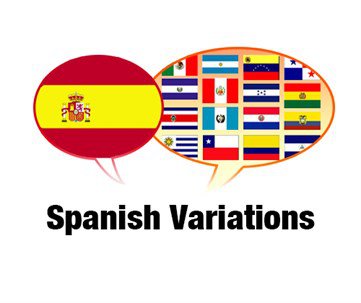Spanish Variations: Spain vs. Latin America
Just as there are differences between American English and British English, there are differences between the Spanish spoken in Spain and the Spanish spoken in Latin America. It’s the same language but there are several Spanish dialects and varieties in terms of vocabulary, pronunciation, and grammar throughout the different Spanish-speaking countries.
Pronunciation
The most noticeable difference between pronunciation in Spain and Latin America involves the letter “z”. In Latin America it is pronounced like the letter “s” but in Spain it is pronounced like “th”. However, other pronunciation differences are minor and do not affect communication between speakers of these two regions.
Vocabulary – Regional Differences in Meaning
In Spanish there is an ambiguity that

makes certain words used in Spain not well understood by someone who speaks LA Spanish. The issue is that different words can be used for the same thing, or the same word can mean one thing in Spain but something completely different in Latin America. I have listed some common examples below:
In Spain the word “carro” is a cart that you push or pull to transport things, whereas in Latin America it’s an actual car that you can drive around in. A car in Spain is a “coche”, whereas a “coche” in Latin America is a baby stroller.
The English term “computer” is an “ordenador” in Spain and a “computadora” in LA Spanish speaking countries.
An “avocado”, is an “aguacate” in Spain and a “palta” in most LA Spanish speaking countries.
And a “potato” is a “patata” in Spain and a “papa” in some LA Spanish speaking countries, like Argentina.
Other words, like “pen”, show differences also within the different countries in Latin America: it’s a “bolígrafo” in Spain, a “lápiz pasta” in Chile and a “lapicera” in Argentina.
Grammar: “Voseo” and the use of “ustedes”
In Spanish, there are three ways to say “you”: “tú” (informal); “usted” (formal); and “vos”.
The use of “vos” and its corresponding verb conjugations is known collectively as “voseo”. It’s extensively used in Argentina, Chile, Costa Rica, El Salvador, Guatemala, Honduras, Nicaragua, Paraguay, Uruguay and in parts of Colombia, Venezuela, Ecuador and Mexico, as well as in many other countries of Latin America. Even though it’s widely used, “vos” also carries many differences for social consideration. In some parts of Latin America it is considered street language, appropriate to say but not correct for writing.
In Spain, there are two ways of saying “you” in plural form: “vosotros” (informal) and “ustedes” (formal). In Latin American Spanish there’s only one: “ustedes”.
I’ll conjugate the verb “jugar” (to play) so you see how it changes according to each pronoun:
| Spanish Spain | Latin American Spanish | |
| yo I |
juego | juego |
| tú you (informal) |
Juegas | Juegas |
| él, ella, usted him, her, you (formal) |
juega | juega |
| nosotros we |
jugamos | jugamos |
| vosotros you all (informal) |
jugáis | X |
| ellos, ellas, ustedes they, you all (formal) |
juegan | juegan |
Example
So, to say “Who are you playing with?”
In Spain: “¿Con quién jugáis?”
In Latin America: “¿Con quién juegan?”
Although I have pointed out several differences, the great thing about Spanish language is that whatever variety of Spanish you speak and whatever speaking country you go, you will be perfectly understood!
If you are interested in reading more about Spanish language, have a look at my blog on what is neutral Spanish?.
